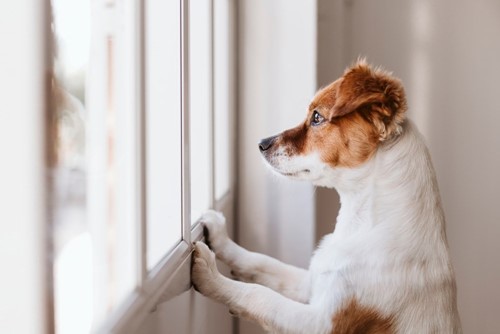Separation anxiety in pets
For many people, the vacation season is already over and summer has flown by. The end of summer in this case also means that children go back to school and adults have to go back to work. After a summer full of fun and daily attention from its owners, your pet may have to get used to being home alone more. Separation anxiety then lurks. In this blog, learn more about separation anxiety in pets and get tips on how to (re)teach your four-legged friend to be home alone.

What is separation anxiety?
Pet separation anxiety involves an animal panicking when left alone. In most cases, the animal has developed an extreme attachment to one particular person and panics when that person is not present. A behavioral disorder such as separation anxiety can occur in many different pets. Consider dogs and cats, but rodents and even ornamental birds can also suffer from separation anxiety. It is a relatively common problem; an estimated 10 to 15% of all pet dogs suffer from separation anxiety. Dogs are pack animals by nature, meaning they like to be part of a group. This explains why separation anxiety is less common in cats; they naturally prefer to live solitary lives.
Symptoms
The symptoms of separation anxiety vary widely. In any case, the difference between the behavior associated with separation anxiety and "normal" bad behavior is readily apparent: your pet is not exhibiting this behavior when you are home or near him. Your pet's behavior depends on the severity of the anxiety. The most common symptoms of pets with separation anxiety are:
- Restlessness during or leading up to goodbyes
- Destructive behavior, such as breaking furniture
- Vocal (barking, whining, wheezing, meowing)
- Panting
- Keeping pacing in the house
- Doing needs in the house
- Escape attempts (breaking doors, the basket or a crate)
- Loss of appetite
- Other stress symptoms, such as excessive licking, biting and scratching
Cause of separation anxiety
To treat separation anxiety in your four-legged friend, it is important to identify the cause of the fear. In general, many pets are creatures of habit and become accustomed to routines. So when you have been home a lot for an extended period of time due to summer vacation, for example, an animal becomes accustomed and attached to that. Other causes of developing a behavioral disorder such as separation anxiety in a pet include when they have been rehomed (multiple times), have been in the shelter or (as a young animal) have had a traumatic experience when alone at home.
How do I (re)teach my pet to be home alone?
The most important principle in remedying separation anxiety is that punishing your animal is not the solution. Punishment actually makes the problem worse: once the animal associates your absence with punishment, the anxiety will only increase. Training will be needed to (re)teach the animal to be alone at home and this takes a lot of time and patience. Your four-legged friend must learn that you will always come back. You train step by step that he can stay alone a little longer and you build this up gradually. Especially in the beginning, keep the training session short and start in an environment where your pet feels safe. During training, make sure you return home before your four-legged friend becomes anxious, otherwise you will have to start all over again. Finally, try to make leaving and returning as normal as possible and do not give your pet excessive attention when you leave or return from home.
Distraction
When leaving home, you can also choose to give your pet distractions. When an animal has distractions, it is less likely to create a stressful situation. A good way to distract your four-legged friend is with food. For example, you can think about filling a kong with wet food or hiding snacks around the house.
Note: Never leave your four-legged friend alone with a chewy snack. The risk of choking is high here.
Behavioral therapy
In some cases, separation anxiety unfortunately cannot be solved with the above tips. If your pet is extremely stressed when you are away from home, it is wise to call in a professional behavior therapist. A behaviorist can guide both you and your pet so that you can hopefully leave the house with peace of mind again and your beloved four-legged friend does not see this as an unpleasant situation.
Lots of dogs already enjoy Riverwood every day. Would you also like your dog to feast on our delicious foods and are you curious which variety would suit your dog best? Then answer a few questions here and order an inexpensive sample pack right away.




